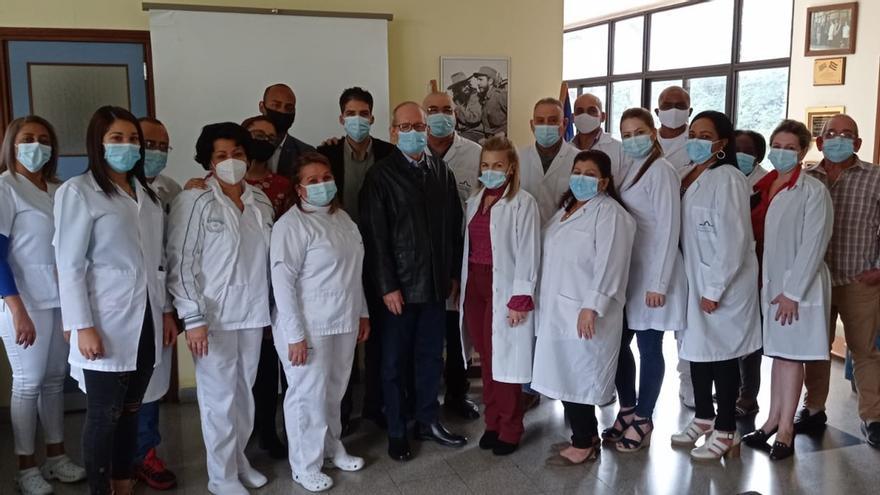
![]() 14ymedio, Havana, July 28, 2021 — The Alliance for Global Freedom (GLA) filed a complaint this Monday with the Attorney General of Uruguay in which it denounces the continuous exploitation and forced labor to which the Cuban medical brigades are subjected in that country.
14ymedio, Havana, July 28, 2021 — The Alliance for Global Freedom (GLA) filed a complaint this Monday with the Attorney General of Uruguay in which it denounces the continuous exploitation and forced labor to which the Cuban medical brigades are subjected in that country.
The lawyers’ group alleges that the island’s health workers “are compensated at such a minimal rate that the work they carry out in the South American nation is considered slave labor.”
“The personnel of the medical brigade are subjected to long hours of work without fair wages, and are pressured to participate, for fear of reprisals by the Cuban state if they do not comply,” the Alliance alleged in a statement published on its website.
“We continue to fight for human rights and appeal to the republican culture and respect for human rights in this country,” said lawyer Sabrina Peláez Iglesias, a member of the GLA in Uruguay.
The organization, headquartered in Washington DC, has been seeking for the last two years “records and information on Uruguay’s cooperation agreement with Cuba.” Among other actions, Peláez also filed a complaint with the National Institute of Human Rights and Uruguay’s Ombudsman in July 2020.
According to the statement, currently about 30 health workers, most of them ophthalmologists, make up the mission, and unlike Uruguayans and other professionals, Cubans do not have to certify their postgraduate degrees with the Ministry of Public Health to practice.
The Governments maintain two health agreements: the first began in 2007 and includes ophthalmological services, and the second, finalized a year later, covers orthopedic care for people with disabilities. Both have been renewed to date.
The second bilateral agreement, extended in 2018, set a cost for Uruguay of 174,000 dollars per year, of which $124,000 is paid directly to Havana and $31,000 is designated as stipends for professionals and technicians on the Island, as well as their national and international transportation, accommodations, and other expenses, according to an investigation by the Cuba Archive.
But it was only recently divulged that the first agreement required that Montevideo spend 250,000 dollars a year on Cuban collaborators, including a monthly stipend of $800 for each one, but the contract did not clarify the amount that Havana received for the services.
The preparation of Cuban doctors has been questioned in several countries where they have worked under agreements with the Cuban Government. In 2019, the press reported that nine specialists from the Island had deserted and that they tried to accredit their degrees in Uruguay, but six of them did not pass the exam and the others did not receive a final definitive qualification.
When these facts became known, suspicions among Uruguayan professionals increased, among them the members of the Uruguayan Association of Ophthalmology. Its president, Andrea Merrone, stressed that they are not opposed to foreign doctors coming to the country, but she insisted on knowing if the professionals “have sufficient qualifications” to practice.
For years Uruguay has been a place highly sought after by Cuban doctors to go on an official mission, due to its social stability. The selection of professionals who travel to that country is made within Cuba and the brigades rotate every two years.
In July of last year, the Alliance for Global Freedom presented a demand to the Uruguayan Government for disclosure of the records related to the hiring of Cuban health workers. Their demand was mainly focused on the bilateral agreements on the service at the José Martí Hospital for exchanging funds and making commercial arrangements.
It is not the first time that the conditions in which Cuban doctors are forced to work in the missions have been denounced. Organizations such as Cuban Prisoners Defenders (CPD) have carried out various actions to expose the medical missions as the Cuban government’s “great capitalist slave business.”
In August 2020, CPD filed a complaint with the United Nations and the International Criminal Court on behalf of 622 Cuban doctors who have been on missions abroad. In its report, the Madrid-based NGO warned that these professionals are forced to participate in “conditions of slavery” with long working hours and restrictions on their freedom.
In most cases, the Cuban government takes away their passports in order to keep a hold on them, and pays them between just 10% to 25% of the salary it charges to recipient countries, arguing that Havana needs money to finance the Health system.
Translated by Tomás A.
____________
COLLABORATE WITH OUR WORK: The 14ymedio team is committed to practicing serious journalism that reflects Cuba’s reality in all its depth. Thank you for joining us on this long journey. We invite you to continue supporting us by becoming a member of 14ymedio now. Together we can continue transforming journalism in Cuba.
